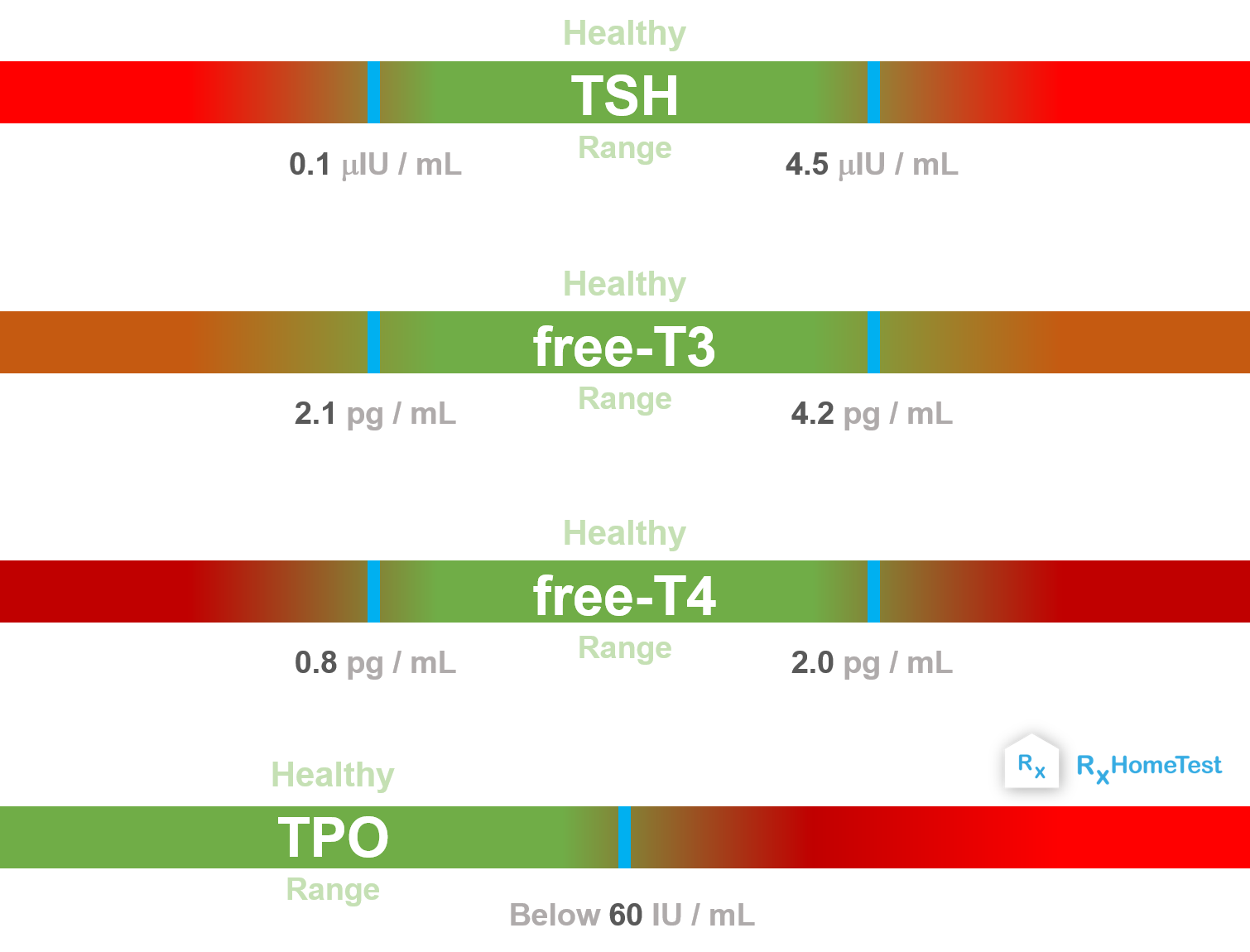
You will learn about: hypothyroidism; hyperthyroidism; thyroid stimulating hormone (TSH); thyroxine (T4); T3; symptoms of thyroid problems; thyroid disorder in women, children and during pregnancy; at home thyroid test; autoimmune diseases; Hashimoto thyroiditis; Grave’s disease; iodine function; foods for a healthy thyroid.
Article Summary:
Thyroid is a butterfly-shaped gland in the throat that's important for mental health, optimal energy levels, and a healthy heart. It helps metabolism and maintains body temperature.
During hypothyroidism, an under-active thyroid results in fatigue, anxiety, weight gain, slow reflexes, allergies, and poor health.
An over-active thyroid in hyperthyroidism causes hyperactivity, nervousness, irritability, insomnia, brittle nails, increased sweating, diarrhea, and excessive bowl movement.
Thyroid releases two key hormones: T4 (thyroxine) and T3 (triiodothyronine)–with four and three iodine atoms, respectively.
The pituitary gland releases another hormone called TSH (thyroid stimulating hormone) which regulates T3 and T4 levels. Normal TSH levels are key to a healthy mind and body.
If there is a problem—e.g., when our own immune system attacks thyroid gland, the body produces TPO antibodies (anti-thyro-peri-oxidase). High levels of TPO antibodies in a blood test indicate an autoimmune disease.
A simple at-home thyroid test with a finger prick sample can measure TSH, fT3, fT4, and TPO antibodies.
Thyroid is a small, butterfly-shaped gland that sits in the throat just below Adam’s apple.
It releases two hormones crucial for our health: T4 and T3. Because of their unique ability to control metabolism, they help maintain weight and energy levels. These thyroid hormones also affect mental health, appetite, energy levels, sleep, sex drive, and overall mood.
Thyroid gland is responsible for regulating body temperature. That's why the feeling of being cold or hot too often is one of the first symptoms of thyroid problems.
An underactive thyroid slows down metabolism, causing a wide range of problems including weight gain, fatigue, anxiety, skin rashes, high cholesterol, fluid retention and a general feeling of unhappiness.
However, an overactive thyroid has totally opposite symptoms: an overactive metabolism with persistent hunger and fatigue. The excess thyroid hormones can cause hyperactivity, nervousness, irritability, insomnia, brittle nails, increased sweating, diarrhea, and excessive bowl movement.

MORE FROM OUR BLOGS:
Normal TSH Levels – what levels are healthy?
Thyroid in Pictures – a graphical summary of thyroid gland and hormones.
Signs of Thyroid Problems – 5 signs when you should take a thyroid test.
All About Cortisol – summary of research on the stress hormone.
All About Vitamin D – a concise review of symptoms and impact.
All About Testosterone – the science behind the hormone responsible for building strong muscles and bones.
About Healthy Metabolism - key markers for checking your metabolic health.
CRP, inflammation and Heart Risk – read about a marker of low inflammation associated with heart attacks.
Hormone Imbalance in Women – learn about the role of estrogen, progesterone and testosterone for women.
There are two types of commonly known thyroid hormones:
T3 (triiodothyronine) – contains three iodine atoms
T4 (thyroxine, or tetraiodothyronine) – contains four iodine atoms
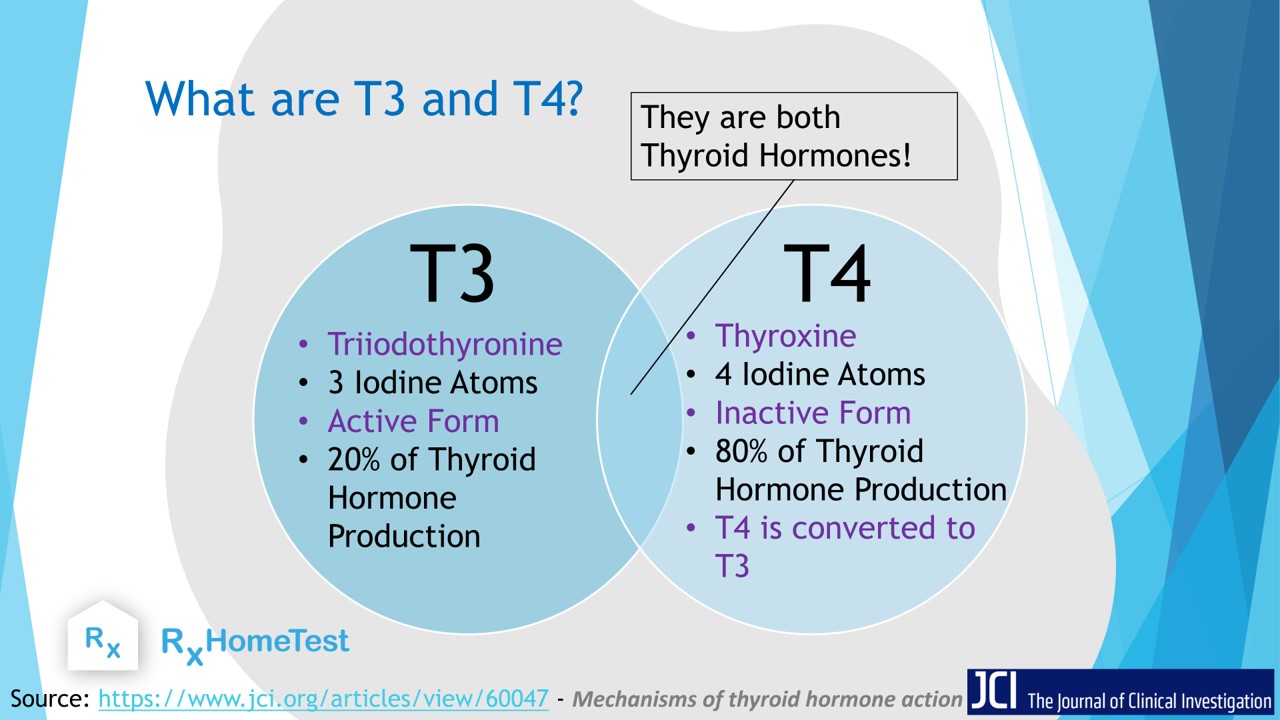
Almost 80 percent of thyroid hormones in the body are available as T4. However, T3 is the active form and readily converts to T4 (Thyroxine), by adding one iodine atom.
An enzyme, called Selenium-iodinase–that contains minerals Zinc and Selenium–helps in this of iodination process. Therefore, both Zn and Se are critical for a healthy thyroid and interference in their supply, e.g., by excess copper that might bind with Zn, can interfere in this conversion.
A third hormone released by thyroid gland is called calcitonin and is very useful in calcium absorption. Calcitonin is different from parathyroid hormone–which is also important in calcium absorption. The later is produced by parathyroid glands located behind the thyroid gland.
TSH (thyroid stimulating hormone) is not produced by the thyroid, but by pituitary gland in our brain. It regulates thyroid function, and is often the first marker in a lab report to diagnose thyroid disorders.

Based on the mood, time of the day, and other daily activities, hypothalamus in the brain senses a need for thyroid hormones and directs pituitary glad through a hormone called thyroid-releasing hormone (TRH). The pituitary releases TSH, which thyroid gland in the throat recognizes to release the thyroid hormones, T3 & T4. Hypothalamus monitors them and tweaks the TRH levels accordingly.
It is a closed feedback loop of TSH, T3, and T4 levels that tightly controls thyroid function.
Therefore, any thyroid hormone test should check all three: TSH, T3, and T4, to assess the health of the HPT (hypothalamus-pituitary-thyroid) axis.
Whenever there is a problem in the HPT axis–especially when our own immune system attacks the thyroid gland, the body produces antibodies called TPO (antithyroperioxidase or antithyroid microsomal antibody). It's a good idea to also check TPO antibody levels using a more comprehensive test.
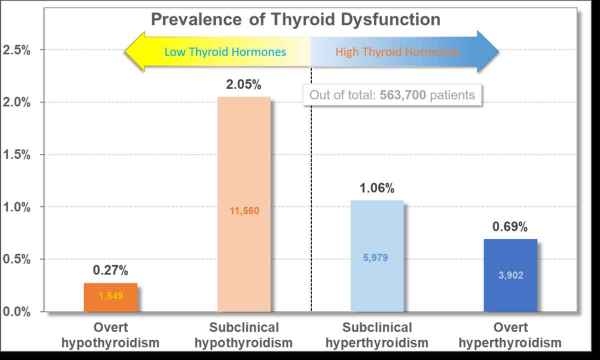
The deficiency of thyroid hormones T4 and T3 is called hypothyroidism. In simple terms, your gland is not making sufficient T4, T3 hormones necessary for the body. At first, when this happens, the pituitary releases more TSH to drive the thyroid gland to increase T4, T3 levels. Therefore, one of the earliest symptoms of hypothyroidism is high TSH levels.
This first stage of high TSH and normal T4, T3 is called subclinical hypothyroidism. Over time, the elevated TSH levels might not be sufficient to raise T3 and T4 levels, resulting in an overt or full blown clinical hypothyroidism.
A thyroid lab test report with high TSH levels and low thyroid hormones (T4 and T3) is used to confirm the symptoms of hypothyroidism disease.
Causes of hypothyroidism normally involve problems with thyroid or pituitary glands, or possible tumors in the hypothalamus. But any problems with the HPT (hypothalamus-pituitary-thyroid) axis can result in low thyroid hormones. One common cause is an autoimmune disorder when the immune system attacks the thyroid gland. Such a condition is called Hashimoto's autoimmune thyroiditis disease.
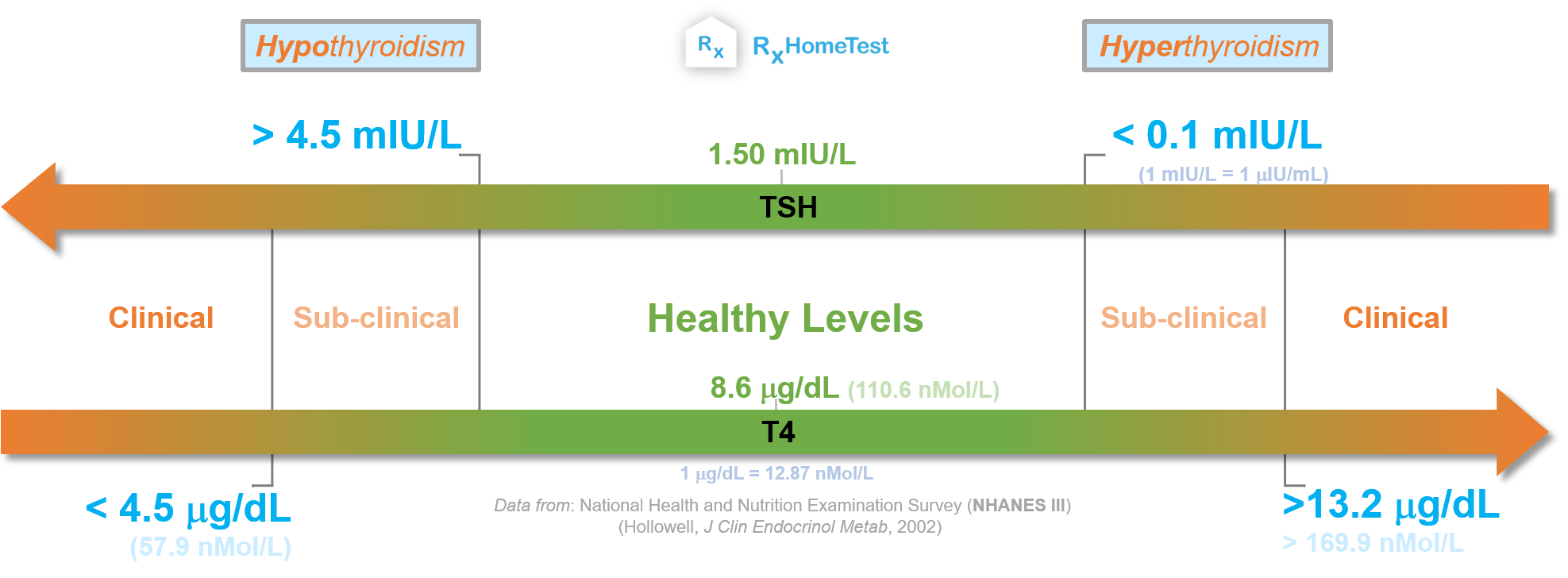
Ranges from lab results of a 2002 survey of US population.
Few other things to note about hypothyroidism:
Early signs are mild and hard to pinpoint to any specific parts of the body since thyroid hormones affect the whole body.
People often disregard symptoms as due to old age, fibromyalgia, menopause, recent pregnancy, or stress in life.
The most common symptoms of hypothyroidism is weight gain.
Approximately 2% of population has severe hypothyroidism and 7-15% has mild thyroid problems.
Low levels of thyroid hormones occur during times of stress or times of life events when body tries to compensate for any fluctuations in thyroid hormones; typical events for the onset of hypothyroidism in women are menopause, pregnancy, or postpartum. That's why thyroid symptoms in women can be difficult to diagnose despite the higher risk.
The list of signs and symptoms of thyroid problems is long as thyroid hormones affect every aspect of our body and can overlap with other health conditions.
Subclinical hypothyroidism is a mild disorder more commonly found in older population with high TSH levels but normal T4 levels. Almost no symptoms of hypothyroidism are observed at the time but chances of developing them in future are high.
Thyroid nodules are abnormal lump-like growths in the thyroid glands. They are not always problematic and should be carefully examined by an endocrinologist.
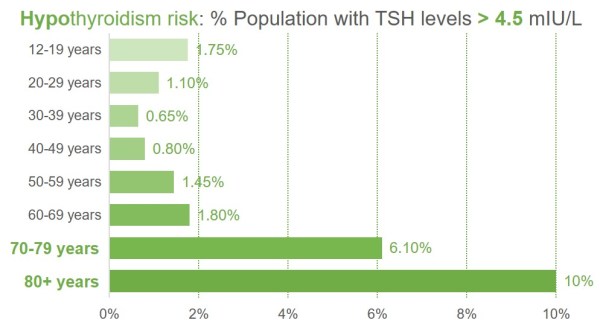
The list of symptoms of thyroid problems can be long. The most important symptoms of hypothyroidism or, low thyroid hormones, are weight gain, slow metabolism, and fatigue. Here is the most comprehensive list of symptoms of hypothyroid disease:
Weight gain – caused by a vicious cycle when low thyroid hormones slow down our metabolism and body starts to store extra calories. This can cause other hormone problems (e.g., insulin resistance) that can lead to even more weight gain.
Loss of appetite – slow metabolism due to low thyroid hormones results in the brain slowing down the appetite centers.
Premature aging – appearance of old, tired, puffy face, bloating, and slurring while speaking.
A lot of menopausal symptoms in women can also be due to undiagnosed thyroid disease. Thyroid symptoms in females can be complex.
Goiter – is an enlargement of thyroid gland due to hormone deficiency (or other reasons). Thyroid goiter is one of the many symptoms suggestive of hypothyroidism but may not be the only reason.
Hypothyroidism causes stiff joints with pain and soreness in muscles, symptoms overlapping with arthritis.
Cold intolerance is one of the important symptoms of underactive thyroid. Slow metabolism causes less body heat that gives a feeling of cold hand and feet. It also causes blood vessels in the skin to constrict making it cool to the touch.
Decreased sweating – due to less body heat from slow metabolism.
Constipation – hypothyroidism causes slowing of bowel function resulting in hard, painful bowel movements and bloating.
Loss of memory and inability to concentrate – due to slow metabolism and fatigue, memory is sacrificed in favor of other brain functions. Body starts to focus on sleeping and eating instead of concentrating and remembering. Signs similar to Alzheimer’s disease can be due to severe hypothyroidism, e.g., forgetfulness, inability to concentrate, diminished intellectual function, speech capability, and even energy, libido, and motivation problems.
Depression – 10-15% of depression patients have hypothyroidism. It causes injury to cells that produce serotonin in brain. Low serotonin results in negative moods, inability to experience pleasure, pessimism, and feeling of inadequacy and doom.
Skin problems – low thyroid hormone causes dry and itchy skin that develops cracks. In severe cases excess carotene causes yellow tinge on skin.
Slow metabolism also slows down hair growth making them coarse and brittle. Sometimes hair start to fall, often in clumps. People with hypothyroidism frequently loose hair in the outer third of eyebrows. Fingernails also become brittle.
Fluid retention – resulting in puffiness in the face or around the eyes, thickening of lips, swelling of hands, feet or legs.
Heart problems – fluid retention and buildup around heart weakens it causing it to swell, which interferes with pumping of blood.
High cholesterol – in general low thyroid hormones cause higher cholesterol.
High blood pressure – both high and low thyroid hormones cause high blood pressure.
Slow reflex test is one of the most sensitive methods to determine subtle thyroid deficiencies.
After lightly hitting the knee with a reflex hammer, an experienced endocrinologist can tell if the relaxation is abnormally slow and return of knee to resting position is delayed.
Cardiovascular diseases – low thyroid causes the bad cholesterol (LDL) to rise. Fluid build up around heart can reduce its ability to pump blood. Increased thyroid hormone speeds up the heart and strengthens its pumping action. Therefore a sudden increase in metabolism due to thyroid hormone increase can strain the heart and cause a heart attack.
Menstrual problems and infertility – Thyroid hormone controls muscle contraction in the uterus. Without proper muscle contractions periods may become longer and heavier, and may be prolonged becoming irregular. Without proper contraction bleeding may not stop. In some cases ovaries may not be able to release the egg.
Gruff or hoarse voice – thickening and swelling of vocal cords results in hoarse, husky, gravelly sound.
Anemia – the low red blood count of anemia can sometimes be caused by hypothyroidism.
Slow reflexes – a key sign of hypothyroidism. The relaxation phase of a reflex slows down when a doctor hits the knee with a reflex hammer. The return of knee to resting position shows delay and experienced endocrinologists use this as the most sensitive way to determine subtle deficiencies.
Snoring or sleep apnea – excess tissue in neck can interfere with breathing that can cause snoring and poor sleep.
Allergies – many people notice worsening of their allergies due to low thyroid hormones.
Hashimoto’s autoimmune disease – is the most common cause of hypothyroidism that affects approximately 15 million people in US. Also called Hashimoto's thyroiditis, our own immune system attacks the thyroid glands. It is seven times more common in women and is often hereditary.
Other forms of damage to thyroid glands – for example, after pregnancy or defects in enzymes necessary for thyroid hormone production.
Damage to hypothalamus or pituitary glands – by tumor, infection, or surgical removal.
Drugs – lithium is known cause of hypothyroidism and drugs containing lithium or iodine can cause thyroid gland problems.
Toxins & pollutants – carbon tetrachloride in drinking water; PCB (poly chlorinated biphenyl) in plastics; a chemical called glyphosate in the common weed killer RoundUp; cadmium in tobacco and sometimes in dried fruits that are dried on galvanized chicken wire (which contains cadmium); triclosan in antibacterial soaps, toothpastes, and dishwashing liquids.
Excess iodine – can shut down the thyroid gland by overwhelming it.
Radioactive treatments and exposure to nuclear waste.
Dietary causes – excess consumption of uncooked vegetables from Brassica family (broccoli, cauliflower, Brussels sprouts, cabbage, mustard, kale, radishes, turnips); there is no issues when one cooks them or consumes in small quantities.
Pregnancy – hypothyroidism in pregnancy is a serious issue and an estimated 2.5% women have some form of it. But hormone changes may make it difficult to assess. It can have serious intellectual and developmental defects in the baby; that’s why testing every 6-8 weeks during pregnancy is usual; however, it is a serious problem in developing countries.
Underactive or overactive thyroid symptoms in women depend on the stage of their life. Abnormal menstrual bleeding, unexpected milk production or severe morning sickness during pregnancy, and early menopause are some of the common thyroid symptoms in females.
Production of high thyroid hormone levels in our body is called hyperthyroidism disease. In simple terms, the thyroid gland makes too much T4, T3 or pituitary produce low TSH levels. In comparison with hypothyroidism, an overactive thyroid produces more than normal T4, T3 which forces the pituitary to lower TSH release.
Low TSH and high T4, T3 levels in a thyroid blood test report are used to diagnose hyperthyroid disease.
Early stage of overactive thyroid is called subclinical hyperthyroidism, with low TSH levels and normal T4, T3. Over time, the low levels of thyroid stimulating hormone might not be sufficient to control optimal T3 and T4 values, which eventually results in an overt or clinical hyperthyroidism.
Stress is one of the key causes of hyperthyroidism. However, it is less common than in hypothyroidism. The risk of hyperthyroidism is highest for youth and elderly as seen in the population distribution below.
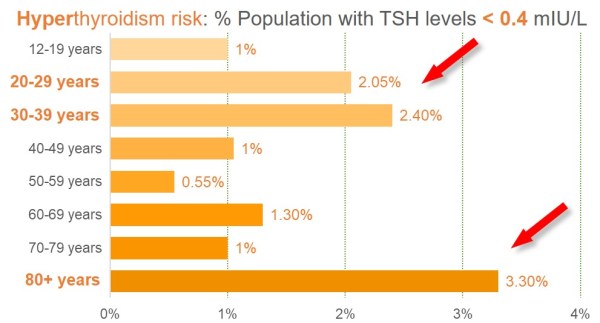
Symptoms of overactive thyroid are usually opposite of hypothyroidism, e.g., it's common to observe a faster metabolism and loss of weight. Here are a few others:
One of the primary symptoms of hyperthyroidism is uncontrollable appetite. People with hyperthyroidism always seem to feel hungry.
Generally one should expect weight loss due to elevated thyroid levels but an increase in appetite sometimes may cause frequent eating causing weight gain.
The elevated metabolism can make you feel hot, hyperactive, irritable, nervous, with symptoms of increased sweating, tremors, heart palpitations, insomnia, brittle nails, diarrhea, more frequent bowels – which are all opposite to symptoms observed in hypothyroidism.
Fatigue is observed in both hyperthyroidism and hypothyroidism as the body keeps fighting under or over production of thyroid hormones.
A unique case of hyperthyroidism is Grave's disease which is essentially an autoimmune thyroid disorder. Symptoms of Graves's disease are similar to hyperthyroidism but notably they include dry, reddish, rough skin and puffy, red, bulging eyes that become too sensitive to light.
The cause of Graves's disease is not yet fully understood. But it starts when our body produces TSI antibodies (thyroid stimulating immunoglobulin) which behave similar to TSH (thyroid stimulating hormone). The combination of TSH and TSI results in excess thyroid hormone production, resulting in this unique case of hyperthyroid disease.
TED or thyroid eye disease is an autoimmune disease of the eyes. The symptoms of thyroid eye disease include 'feeling of sand' in eyes, puffy, red eyelids and forward bulging of eyes that stands out.
Since thyroid hormones T3 and T4 carry three and four iodine atoms, respectively, it is one of the most critical elements for thyroid health.
The primary role of iodine in our body is to actually make thyroid hormones: as much as 75% of body’s iodine is utilized by the thyroid gland.
Optimal iodine levels are essential as both low and high amounts can damage the thyroid gland.
Insufficient iodine may result in swelling of thyroid gland, or goiter, where the throat becomes abnormally large.
Very high levels of iodine can cause thyroid dysfunction by shutting down the glands completely.
Symptoms of excess iodine include headaches, vomiting, mouth sores, metallic taste in mouth, swollen salivary glands and rashes. They are often due to excessive consumption of supplements such as kelp or pills which release a huge burst of iodine in a short period.
The recommended daily allowance (RDA) of iodine is approximately 150 microgram per day. One tablespoon of iodine salt contains almost 300 microgram.
On an average, people in US consume 300-700 microgram of iodine per day.
The main source of iodine in our diets is iodized-salt. There is no iodine in sodium chloride (table salt), and it is specifically added for iodine supply.
The free running and kosher salts can help reduce this daily excess of iodine, if required.
Other natural sources of iodine include seafood and sea vegetables, preservatives, red dye # 3 (commonly added to red, orange, or brown processed foods, pills, capsules), thyroid support formulas (kelp, bugleweed, bladderwrack).
Other foods that contain iodine are: seaweed sushi wraps, dairy products, commercially baked goods, snack foods, egg yolks, chocolate, molasses, soy products, rhubarb, potato skin, and foods grown near the coast.
Pregnancy and breast feeding require higher iodine in the daily diet.
It can be tricky to diagnose thyroid hormone imbalance as similar symptoms could be due to many unrelated reasons.
Because multiple organs are involved (hypothalamus, pituitary, thyroid, immune system), a thyroid test may require checking several markers.
Ranges for thyroid blood test results are very narrow as the plot on the top of this page shows.
Symptoms overlap with other conditions and easy to dismiss due to other problems.
The best test for thyroid function is a blood test that checks TSH, T3, T4, TPO antibodies, and other markers.
Such a thyroid blood test for low thyroid function, during early or late stage of thyroid deficiency or an immune attack on the body, can check thyroid disorder.
Where can I get a thyroid test? An at-home thyroid test can let you collect a sample from home and get results in less than a week.

Order an At-Home Thyroid Test.
There are at least four key markers that should be part of a comprehensive thyroid test:
TSH: first indication of thyroid problem is changes in TSH hormone. For an under-active thyroid, TSH levels will rise to stimulate the thyroid to produce thyroid hormones. If problems with thyroid continue, abnormal thyroid hormone levels will be observed. But not in the early stage when they can be compensated by extra TSH. Measure TSH during the day time as TSH levels often surge at night even in healthy conditions.
fT3 (free T3 or triiodothyronine) – of the two thyroid hormones released by the thyroid glands, 20% is T3 and 80% is T4. The T4 converts to the active T3 form. However, both T3 & T4 are bound to a protein called TBG (thyroid-binding globulin). Only the free form is active and it is the best indicator for potency of that hormone. The test will measure the amount of free T3 in the blood.
fT4 (free T4 or thyroxine) – only about 1% of T4 is unbound and free to be converted into T3 and the test will measure this free form.
Antibodies (TPO, thyroid peroxidase or antithyroid microsomal antibody) – the most common cause of thyroid problems is autoimmune disorder when our own immune system attacks the thyroid gland. The presence of high levels of antibodies will indicate an immune system attaching these glands. Normal TSH levels but high TPO values may indicate other autoimmune diseases.
Some thyroid tests might also check reverse-T3, Tgbn (thyroglobulin) and other markers depending on specific conditions.
Eat lots of fruits and vegetables – as they have anti-oxidants (e.g., beta-carotene, vitamin A, vitamin C). The anti-oxidants are useful for cleaning up oxygen-rich free radicals that hinder the immune system. Immune system attack is one of the main causes of hypothyroidism.
Eat foods high in Selenium and Zinc – both minerals are anti-oxidants and also crucial for T4 to T3 conversion.
Selenium: found in whole grains, tuna, halibut, mushrooms, oatmeal, wheat germ, sunflower seeds; those with bacterial infection might be deficient as bacteria need Selenium for survival and growth.
Zinc: found in beef, herring, maple syrup, turkey, wheat bran, sunflower seeds; children with Down’s Syndrome and people with obesity tend to have lower levels of Zinc. For other foods and supplements, check this list from Cognitune.
Avoid too many raw goitrogens – these are food sources that contain iso-thio-cyanates that interfere with gland functioning. They include cruciferous vegetables from the Brassica family, e.g., cabbage, broccoli, Brussels sprouts, turnips, rutabaga, mustard, kohlrabi, radishes, cauliflower, cassava, millet, and kale. They only cause problems when eaten in large quantities and raw.
Reduce certain foods - such as peaches, peanuts, pine nuts, spinach, and strawberries can also inhibit thyroid function when eaten in large amounts. There is no need to eliminate these food items from diet but it helps if one avoids eating in large quantities and over a long period.
Avoid excessive soy in diet – soy is one of the best natural sources of protein that is also vegetarian and vegan. But the estrogen-like compounds in it can block absorption and action of thyroid hormones when consumed in excess.
Lifestyle factors known to play a role in thyroid function: sleep quality, staying up late on weekdays, exercise intensity, smoking, and iodine-rich foods.
Physical activity – regular exercise is critical for hormone balance and healthy metabolism. It is best to exercise during a time of the day when your energy levels are at their peak.
Stress reduction – stress can cause improper functioning of thyroid hormone, slower metabolism, and weight gain.
Excess iodine from dietary supplements, e.g., kelp, bugleweed, bladderwrack can interfere with thyroid function.
